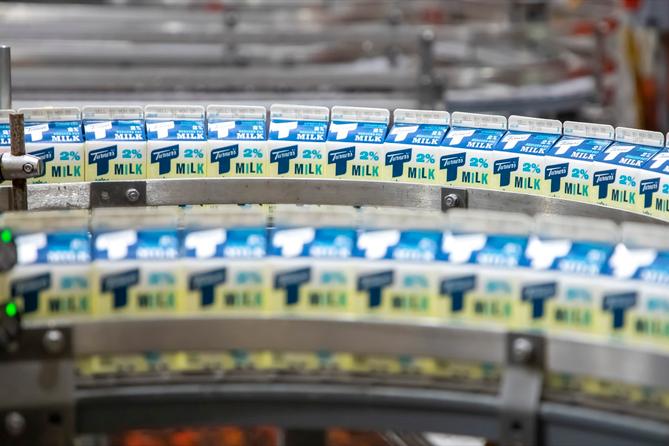Republican lawmakers concerned about nutrition quality in Pennsylvania schools have introduced bills that would ban food dyes and allow whole milk, changes they argue will improve student health.
Similar legislation introduced in recent sessions did not advance, but one sponsor of the latest measures told Spotlight PA she thinks growing public concerns about processed food can help the bills pass.
Improving child nutrition has become a GOP plank as Robert F. Kennedy, the U.S. health secretary, has criticized food policy as part of his “Make America Healthy Again” effort.
Last week, a long-awaited report from a MAHA commission chaired by Kennedy declared, “The health of American children is in crisis,” and listed synthetic additives and “ultra-processed foods” as key contributors.
State lawmakers expressed similar urgency: “Our food is literally killing us,” reads the memo for the Healthy PA Package, which includes the food dye proposal.
Critics argue some of these regulations are unnecessary given existing state and federal consumer protections. And they question the scientific basis of the proposals.
Title: Healthy Student Act
Prime sponsor: State Rep. Natalie Mihalek (R., Allegheny)
Summary: This bill would ban public schools from purchasing or serving foods containing certain synthetic food dyes.
Mihalek, a parent, told Spotlight PA that the proposal was inspired by “keeping track of what my kids are buying in the cafeteria.”
She thinks current food offerings are unnecessarily limited. “The reality is, there are so many more choices — so many healthier choices — out there. There's really no reason to be selling artificial dyes to our kids,” Mihalek said.
Her bill targets six petroleum-based synthetic dyes — Blue 1, Blue 2, Green 3, Red 40, Yellow 5, and Yellow 6 — and would not allow foods containing them to be sold on school grounds “during the school day,” including in vending machines. The bill does not specify consequences for failing to comply or detail how the ban would be enforced.
Mihalek hopes that a growing interest in healthier diets, spurred by Kennedy’s political rise, will help move the bill to the governor’s desk.
“This is just something that came to the forefront and now everybody's talking about it,” Mihalek said.
Kennedy has received backlash for his wavering positions on the safety of vaccines and his leadership of the federal health system. In recent months, thousands of public health workers have been laid off under a restructuring he’s helmed.
The dyes included in Mihalek’s bill are approved by the FDA, but Kennedy announced last month that he plans for the agency to begin pushing companies to "voluntarily phase out" the chemicals.
Other states have enacted similar measures in recent years. California and West Virginia ban the same synthetic food dyes from food in schools, or more broadly.
While there is no definitive proof that synthetic dyes directly cause behavioral issues, some studies have suggested a link between artificial food coloring and hyperactivity and anxiety in certain children.
The proposed prohibition wouldn’t take effect until July 2027, a timeline Mihalek said would give school districts time to prepare and identify alternative vendors before the changes are implemented.
Through a spokesperson, the Pennsylvania School Boards Association, which represents school directors statewide, told Spotlight PA it is neutral on the bill.
Mihalek introduced the measure as part of a broader package of bills focused on food safety and public health. The package includes bills targeting food labeling and ingredients for all Pennsylvanians, including one that would mandate disclosure of the above dyes for any food product sold or manufactured in the commonwealth.
The healthy students bill has been referred to the state House Consumer Protection, Technology, and Utilities Committee, but has not been brought up for a vote.
The Democratic-led committee recently held a hearing on food policy that included a discussion of a potential ban on artificial food dyes, indicating growing interest in advancing related legislation.
Business representatives opposed such a ban during the hearing, arguing it would impose unnecessary regulations.
“At the end of the day, this is all done while no meaningful improvement in public safety outcomes is made,” Aaron Riggleman of the Pennsylvania Chamber of Business and Industry said at the hearing. “Because the ingredients have already been reviewed and thoroughly vetted by the FDA.”
Title: Whole Milk in Pennsylvania Schools Act
Prime sponsor: State Sen. Michele Brooks (R., Mercer)
Summary: This bill would allow Pennsylvania schools to purchase and serve whole and 2% milk produced within the state.
Currently, Pennsylvania schools can only offer 1% or non-fat milk, a restriction stemming from a 2010 federal law. The law was aimed at reducing childhood obesity and improving overall nutrition, but Brooks argues whole milk was unnecessarily restricted.
“Thirty years ago, 35 years ago, kids weren't nearly as obese … and we drank whole milk. There was literally cream on top of the milk,” Brooks told Spotlight PA. “I think there's other ways that we can work on [this.]”
Whole milk contains more calories and saturated fat than non- and low-fat milk. But it also has higher levels of omega-3 fatty acids, which are beneficial for brain development and heart health.
Brooks wants to give school districts the option to purchase whole milk, and noted that the bill would not require them to do so.
She said that she’s heard from her constituents that kids routinely throw away skim milk because they don’t like the taste, adding that it is “somewhat absurd that [the regulation] was done in the first place.”
A range of lawmakers, including Brooks, have proposed this legislation multiple times, but such a proposal has never made it far in the legislative process.
Currently, the bill is awaiting consideration in her chamber’s Education Committee.
The Pennsylvania Farm Bureau, which represents farmers, has previously supported the measure. Asked about school districts' position, a spokesperson for PSBA said the association is officially neutral on bills that would reintroduce whole milk to schools.
This story has been updated to clarify the Pennsylvania School Boards Association’s positions on the bills.
